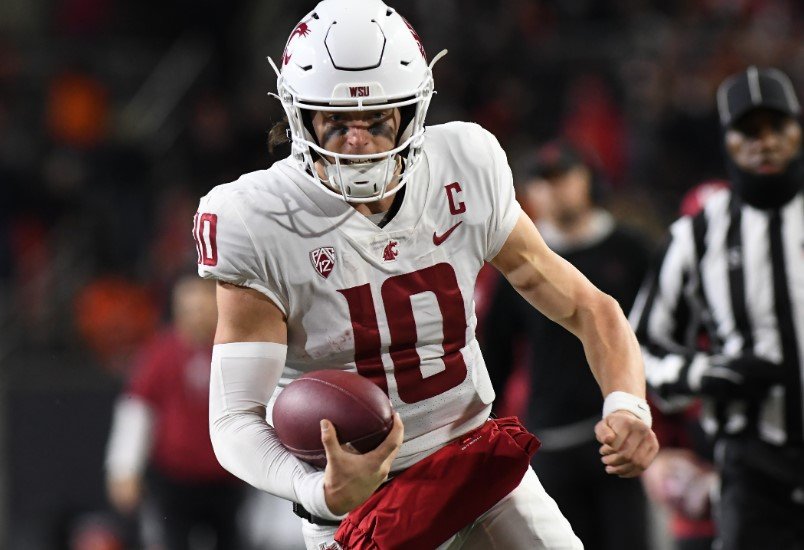John Mateer, the promising Oklahoma quarterback, is facing renewed attention following the appearance of Venmo transactions labeled “sports gambling” from late 2022. Despite the screenshots circulating on social media, Mateer insists these are just harmless jokes between friends and denies ever betting on sports.
Social Media Screenshots Stir Fresh Debate Around Mateer
The screenshots in question show two Venmo transactions dated November 20, 2022, when Mateer was still a freshman at Washington State University. Both payments were reportedly sent to a Venmo account linked to Richard Roaten, with one specifically marked “sports gambling (UCLA vs USC).” The timing raised eyebrows, as the UCLA-USC college football rivalry game took place the day before.
Mateer’s quick response on social media was a flat denial: “I have not engaged in any sports gambling. These labels are inside jokes between me and my friends. I have never bet on sports.”
The NCAA, which bars student-athletes from betting on any sports, collegiate or professional, has not confirmed whether it has opened any investigation into Mateer. Violations of this policy can lead to severe consequences, including loss of eligibility to play.
Oklahoma Athletics Keeps Close Watch, Cites Preventive Measures
The University of Oklahoma’s athletic department declined to comment on any specific inquiry into Mateer but emphasized their ongoing commitment to education and oversight regarding sports gambling. They pointed to their partnership with ProhiBet, a monitoring service widely used across college sports to detect suspicious gambling activity.

“OU Athletics is unaware of any NCAA investigation and has no reason to believe one is pending,” the university said in a statement. The athletic program highlights how seriously they treat any gambling allegations, promising to work closely with the NCAA when concerns arise.
Washington State University also has not responded publicly to the situation.
A Bright Career Shadowed by Controversy
Mateer’s football talent has long been in the spotlight. Last year, as the starting quarterback for Washington State, he threw 29 touchdowns and added 15 rushing touchdowns, earning him high praise and the attention of top programs. His decision to transfer to Oklahoma—a program eager to regain national prominence after two losing seasons—was widely covered.
Yet, this off-field drama arrives just as the NCAA and college sports more broadly face challenges adapting to changing attitudes toward sports betting. The Supreme Court’s 2018 decision to overturn PASPA legalized sports gambling across much of the U.S., prompting the NCAA to rethink its policies.
The NCAA’s Changing Approach to Sports Gambling
While the NCAA traditionally banned all forms of sports betting by athletes and staff, recent trends show shifting perspectives. A 2023 NCAA survey of over 500 athletic department employees at Division I schools found that 27% dealt with a sports betting issue among athletes or staff in the past year—up sharply from 2019.
In June, the NCAA’s Division I Council proposed loosening restrictions, potentially allowing athletes and staff to place bets on professional sports. The move acknowledges the difficulty in enforcing a total ban amid the growing legalization of sports betting nationwide.
Here’s a snapshot of the NCAA’s survey findings:
| NCAA Sports Gambling Survey (2023) | Percentage |
|---|---|
| Division I schools providing sports betting education | Over 95% |
| Schools reporting recent sports betting problems | 27% (up from prior years) |
These numbers reflect a landscape where gambling is increasingly part of college athletes’ lives, whether officially allowed or not.
What’s Next for Mateer and College Sports?
For Mateer, the spotlight is on clarifying the nature of these transactions and maintaining his eligibility to play. The Venmo screenshots, though from nearly three years ago, have resurfaced just as college sports debate loosens restrictions on betting.
Questions linger: How will the NCAA handle such cases if they emerge from past actions? Can education and monitoring programs effectively curb risky behavior?
In a sport already brimming with pressure, these off-field concerns only add to the complexity athletes face.
As for Mateer, the next steps will be closely watched by fans and officials alike. For now, the Oklahoma quarterback insists he has done nothing wrong—and hopes to keep the focus where he prefers it: on the football field.








